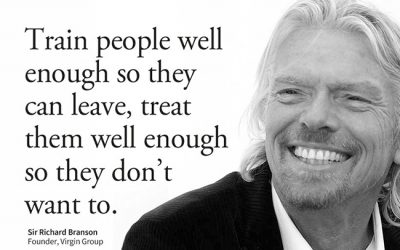Leaders do not need to be told what to do. If they can see their situation clearly and understand their options fully, most of the time they will make the best call. Helping someone see clearly and understand fully is a process, and it may not always be easy, but it’s always worth it. When I’m working with a client, and I see they’re so close, it’s sometimes tempting to crack and just give them the answer. And that’s most often a bad idea.
As coaches, when we give someone a solution, we’re not basing that advice on their specific situation. We’re basing it on something we’ve seen work before for someone else. Similar advice might be a great idea in this situation too. However, it may not be the best solution for that leader; because, no matter how similar something might look on the surface, every scenario is different … and it’s in the process of digging deeper to reveal that nuance where we find the difference between a good answer and the best answer.
The Power of Good Questions
How do we reveal that nuance and find the best answer? We begin with asking good questions. This is a process, and it requires engagement from both sides. If the coach and the client are not both on board, the process that creates the best answers breaks down.
One of the easiest ways to get stuck is to assume what’s coming next. As leaders, it’s natural to want to know where something is headed. We’re goal-oriented people who keep the end in mind. Those are good things. However, in this kind of conversation, trying to figure out where someone is going becomes a distraction. If the coach and the client can commit to engaging in a constructive back and forth, letting the conversation go wherever it might lead, we arrive at breakthrough together.
You may be familiar with this sort of conversational style, sometimes called Socratic dialogue. By taking this approach – and by resisting the urge to just tell people what we think they should do – leaders see for themselves where they’re stuck. Once we see what’s holding us back, we have a choice to make. Will I continue to be stuck, or will I shift my thinking in a way that leads to freedom? Time and again, I’ve seen leaders choose to make that shift, creating breakthrough for them and inspiration for their team.
When I’m working with a leader, the questions don’t stop at that first level of breakthrough. If we’re fully engaged in the process together, we create a series of questions that lead to even better questions leading to ongoing breakthrough and continual growth.
How Questions Guide the Process
Another important aspect of my approach to coaching is the understanding of process. Leadership is not about “getting there,” it’s about continual growth. The moment you decide “I’ve arrived,” you put a lid on your potential, as well as the level of success your team can achieve.
This happens in coaching, too, when we stop asking questions and start trying to offer solutions. At that point, we’ve stopped really listening, and that shuts the exchange down cold. That’s easy to do, especially when we’re focused on what someone is saying and not who they’re being. That’s a vital distinction. When we focus on what someone is saying, we spend a lot of our time trying to interpret what we think they “really mean.” However, when we focus on who that person is being—the why part of what they’re saying—we catch the deeper meaning without stirring in our own assumptions.
To learn more about my coaching, click here.
Asking questions, rather than making statements or offering solutions, allows the coach and the client to connect on a deeper level. This, for me, leads to more effective coaching. For my clients, this reveals where they’re stuck and how they may break free.
Most important, they come to those answers on their own … and that brings us right back to the main point. Leaders don’t need to be told what to do. We need to be guided around or through the things that get us stuck, so we see the solutions for ourselves.
How have good questions helped you find the answers that led to success in your life or work? Share your thoughts in the comments below.

Game of Leaders: There is No Throne Because Everyone Wins
Despite what some memorable characters from a certain hugely popular TV program would say, leadership is not about vanquishing everyone around you to earn the right to cast down edicts from atop an imposing throne. Leadership is nurtured within a person...

Turning Thirty
Turning Thirty Guest Blog by Ashley Hofecker Real talk: My younger self thought I’d “have it all figured out” by the time my 30th birthday rolled around. I’d have traveled so many places, done so many things, and earned so many titles, personally...

Being Present in a Spirit of Harmony
Remember family road trips as a kid? Music and games and junk food. And, inevitably, arguing with your siblings in the back seat. Over toys, over space… over nothing. At some point, mom or dad turned around in their seat, threatening: “You’re pushing your...

Why Success Requires Bifocals
Ask anyone who has accomplished anything, and they will tell you achievement is the result of a long, challenging, and rewarding journey. One of the key dynamics in that success journey is finding the right balance between “seeing the big picture” and...
4 questions to prepare you for your next big opportunity
In recounting stories of their success, people often say that one opportunity changed the trajectory of their life. We hear it all the time: on awards shows, after sporting events, during graduation speeches. Someone, at some point, was presented with an...
5 questions every employee wants their boss to ask
Recently, Forbes published a list of 10 Things Only Bad Bosses Say. While most of us have ‘bad boss experiences’ in the past, so we may relate, this article got me thinking about some of the things great leaders say to inspire and motivate their teams....
What Richard Branson looks for in a leader
Sometimes, as leaders, we feel pulled in two different directions, do we invest our time and energy in our employees or our customers? While it’s easy to say “both,” the reality is, we have limits on our time, so one or the other is going to get more of...
Creating an environment that encourages people to lead
In our most recent blogs, we looked at two different real-world customer service scenarios. In one story, both an employee and a manager fumbled a simple service opportunity that nearly cost them a long-time customer. In the next story, one employee chose...
A leader steps up and saves the deal
In our last blog, I shared a friend’s story of what he called “bewilderingly poor customer service,” that left him wondering why neither the employee nor the manager seemed to know how to fix the problem … or felt empowered to do so. Today’s story begins...
A customer service miscue leaves a lasting impression
In our last blog, we talked about the importance of investing in our team members personally, as well as professionally, and what that means for our organization. In this blog, I want to share a story about what can happen when leadership focuses on skills...








0 Comments